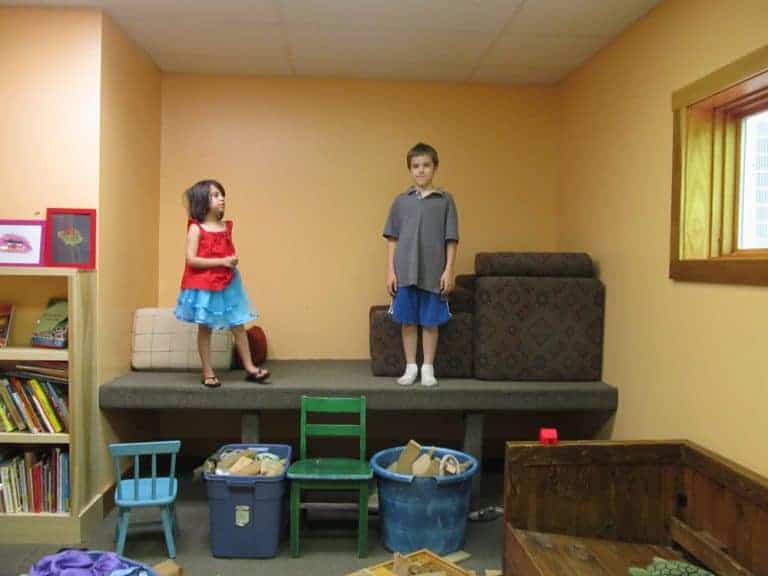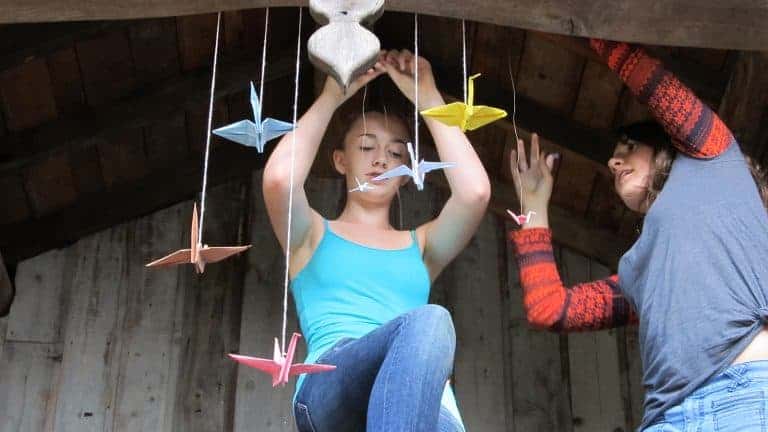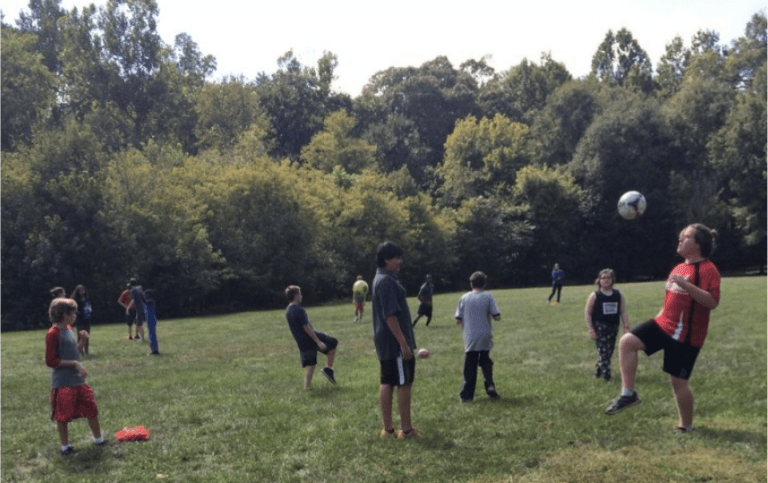"Who Will I Become Today? (Part 2 of Mark McCaig’s Berlin speech)
Another role we’ve seen grow and develop at school is the role of animal caretaker. So many of our young people have strong feelings for and about animals. We have always had ethical vegetarians and vegans on campus. Students have kept snakes on campus. We had a fish tank for a year or two. Now there is a Pet Corporation, whose primary task is to approve visits from School Meeting members’ pets. (Of course, we had one student who objected to the name “Pet Corporation” itself, as her morals could not abide the idea that humans “own” pets at all! Still, after expressing her opinion, she gracefully accepted the word “pet.”) When somebody wants to bring a pet (usually a dog) the Corporation asks these type of questions: Does the dog have her shots? Is she friendly? Where in the building can she stay if a storm comes? We’ve also seen avid defenders of animal rights in the Judicial Committee (JC.)
One of our most earnest animal advocates had a part-time job working with animals before she graduated and is now enrolled in Saint Mary’s College. She recently won her college’s Mendel Award for being the most outstanding Biology student, and her passion for animals will almost certainly create her career.
Our students take animals on campus very seriously, and they develop a complicated understanding of both animals and humans as a result. Once more, by playing the role of animal caretaker at school, the students experience negotiation, ethics, and compromise. They learn about something external (the animals, the other people) and they learn even more about themselves. Again, I think these are invaluable things they take into their lives after Fairhaven School.
Sticking with animals for another moment, let me talk just a bit about horses today. Fairhaven School is located in Maryland, a part of America known for its horse farms, and since the beginning, we have attracted some students whose primary passion is horses. One of the fantastic elements of a Sudbury school is its flexibility, and we have had many of our “horsey girls” spend time riding and working at nearby barns during school throughout the years. Of course, a long-term pursuit of horseback riding creates any number of admirable qualities, among them physical fitness, a work ethic, personal responsibility, and maturity. (As a side note, one of the many benefits of being a student at Fairhaven School or at Ting Schule is a relative freedom from homework, as compared to more traditionally schooled peers. As a result, a Fairhaven student can pursue his or her interests relatively free from the constant burden of homework, whether that interest is horseback riding, dance, acting, music, soccer, a part-time job, or even taking classes at a community college.)
Through the years, the horsey girls have also used their creative imaginations to play the roles of horses and trainers on campus. Picture a group of three or four girls in the yard at school. Three are pretending to be horses, cantering or trotting around a course of jumps, while the other is the trainer, putting them through their paces. For many of them, this has been one of their principal activities for years at a time. Although one can se it as a beautiful example of play and role modeling, what does this game actually do for the girls? Some years ago, this herd of girls formed a tribe, calling themselves the Munchkins, even electing a Queen every year. They developed an entire little world within the school, with its own rules, practices, and customs. This is true for most groups at school, and another hallmark of Sudbury schooling. I can almost guarantee that Ting Schule and every Sudbury school has these groups, groups that are more than “clubs,” in fact groups that are for many of our students their most important activity. How does a brain and a person grow and develop? This is a very complex, mysterious process, one that involves what we call “the whole person”— the mind, spirit, and body. It seems that forming and participating in groups like the Munchkins is crucial to this process.
We had an Alumni Panel last March where one of the older Munchkins reflected upon her experience. Now working as a team leader at Whole Foods in Annapolis, Erin says that her job reminds her of her exactly of her time with the Munchkins. She herds her team! So, just like the biology student, the role she played at school has translated directly into the role she plays as an adult. She also told us that she is one their youngest team leaders and she attributes her success directly to her experiences at Fairhaven School, experiences that could almost all be described as role-playing.
Amplifying further on this concept, it might help to realize that roles people play at school often change and overlap, or they evolve from micro-roles into macro-roles. Erin’s is a perfect example. While she may have begun as just another member of the Munchkins, she eventually became a leader. Where I come from, this idea of leadership has become a big business. In the end, people at Sudbury schools have vast potential for leadership, both because they have been able to lead themselves through their days and because they have had access to real power in our democratic environment.
One of the most common activities at school is gaming. From the beginning, our students have spent hours upon hours playing computer games, video games, Dungeons and Dragons, and something they call the Paper Game. All of these games involve “thinking as if.” Here is what Courtney writes about this:
“The creative imagination is essentially dramatic in character. It is thinking “as if.” It is to see an event from two points of view, to see possibilities, to see the relations between two possibilities, to see the relations between two ideas and the dynamic force between them.”
In quoting this, I have to say this perfectly describes the give and take that happens in the democratic process of School Meeting. However, it also captures the essence of the experience of the gamers at school. In Dungeons and Dragons, the players mentally inhabit a created world in which they must imagine and create the outcome of their adventure. They must see things from numerous perspectives, and they must think “as if.” If I am a Ranger, how would I respond to the situation? If I am a priest? How will we solve the problem before us? How will my fellow gamers respond? Of course, the dungeon master has devised the world, and in doing so has also thought “as if” by considering how his or her players will react to the situations. Our “D and D” crowds have spent years playing these games, often continuing games at home, all the while developing what Courtney calls “creative imagination.”
Our students have also developed a game called “the Paper Game.” In it, the players wholly imagine and inhabit a created world, using only paper to draw and write its contents. Sometimes, they have even discarded the paper, so the game is entirely oral! (For an in-depth look at “The Paper Game,” see the chapter on games in Like Water, my book about Fairhaven School’s first ten years. The book is available from the school and at Amazon.)
Of course the virtual example of this type of play can be found in video games and computer games, and no activity at school has generated more parent anxiety than computer games. At Fairhaven School, we can see the many benefits of computer and video gaming: gamers develop social skills, they become computer literate, and many young students even learn to read by gaming! This form of gaming also fosters creative imagination, because gamers assume roles when they play. Over and over, they think “as if.” One essential component of role-playing and gaming is the concept of “do-over.” In our schools, when a student makes a mistake or fails (in gaming terms if you do not “beat the level”) he or she always gets a chance to start over, to try again. Crucially, students do not get assigned a failing grade. Rather, they dust themselves off, learn from their mistakes, and try again. This is yet another attribute our students take into the world: they do not fear failure, and in fact they learn to see failure as opportunity.
Speaking of trying again, as I said earlier one of the important aspects of role-playing is that people change roles with time. Nothing is static. At our schools perhaps the most important committee is the Judicial Committee (the “JC”), the group that meets daily to decide questions of law and order at school. Anybody has the right to “write somebody up” if they think another School Meeting member has broken a rule. Elected clerks run the meeting, and everybody must serve on the JC, alternating just like jury duty. It is a remarkable, complex system of justice, the place in Sudbury schools where freedom and responsibility intersect. Every year, we have students who used to be major rule breakers become upstanding citizens, even leaders in the JC. Again, changing roles from law-breakers to law-enforcers. The other day at School Meeting I watched in awe as a ten-year-old who had been an outlaw in JC for years made eloquent speeches about suspending a younger student who had stolen two dollars. Because he had been allowed to fail repeatedly as a younger student, he now has become a leading voice of responsibility and maintaining the school’s environment.
And so they grow and develop. Courtney writes the following:
“Acting is the way we live with our environment, finding adjustment in play. The young child, facing what is not understood, plays with it dramatically until it is. Alongside the actual world we create a dramatic (fictional) world, which allows us to work with the actual and master it. As this process is vital for the future of humanity, it lies at the center for education. Without it we would merely be a mass of motor reflexes with scarcely any human qualities.
…The increasing mechanism of our pseudo-scientific society does not focus on essential human qualities; as a result people are becoming more disassociated from their human-ness. In contrast, “looking at things from another person’s point of view” is a dramatic act. It enables people to work together with trust, it cultivates the “whole human being,” and it concentrates upon our creative potential. It destroys stereotypes and dissociation. If we wish our children to live and work in a human world in the next century, the creative imagination must be encouraged and fostered by schooling.”
And this is precisely why we have established Fairhaven School, and I assume it is why the staff at Ting Schule do what they do. We want to cultivate “whole human beings.” In order to do that, they play countless roles at school including the following: Entrepreneur, Student, Athlete, Artist, IT person, Lawyer, Judge, Citizen, Parent, Chef, Soldier, Nurse, Actor, Stage Hand, Leader, Carpenter, Philosopher, Environmentalist, Activist, Teacher, Legislator, Money Manager, Public Relations Representative, Grief Counselor, Therapist, Friend, Crisis Manager, Gardener, Event Planner, Zombie, Puppy, movie director,
Mother/sister/brother, and lately, Katniss Everdeen from the book and movie “The Hunger Games!”
In closing, permit me to tell you about one more student, a young man who has written his thesis and is preparing to defend it before the Diploma Committee, made up of staff members from other Sudbury schools. In his thesis, he describes how miserable he was in public school before he found Fairhaven School. Although he is very intelligent, his chronic health problems made it impossible for him to thrive in a curriculum-dominated school. So for the past five years, he has rediscovered himself and his joy not just for learning, but for life itself. Doing what many students do as one way to embrace their newfound freedom, he removed his shoes upon arrival and he has seldom worn his shoes since! He has played many roles on campus, including Dungeon Master, counselor to his friends, JC Clerk, and committed School Meeting participant. He hopes to study law, and has a keen eye for injustice. His mother calls Fairhaven “the school that saved my son.” Last week he sat on a blue couch holding the final draft of his thesis, and he asked me if I could help him find a title for his essay. We looked through the text one more time, searching for any phrases or concepts that would encapsulate his thesis and his Fairhaven School experience. Then on the final page, there it was: “Putting My Shoes Back On.” He knows he’s getting older now, and he’s hunting for jobs and applying to colleges. He’s ready, and he knows it’s time to wear his shoes, to literally step into his life. The school has prepared him for adulthood, the ultimate role he and all of our students will play, and he will succeed.
Mark McCaig
May, 2012


